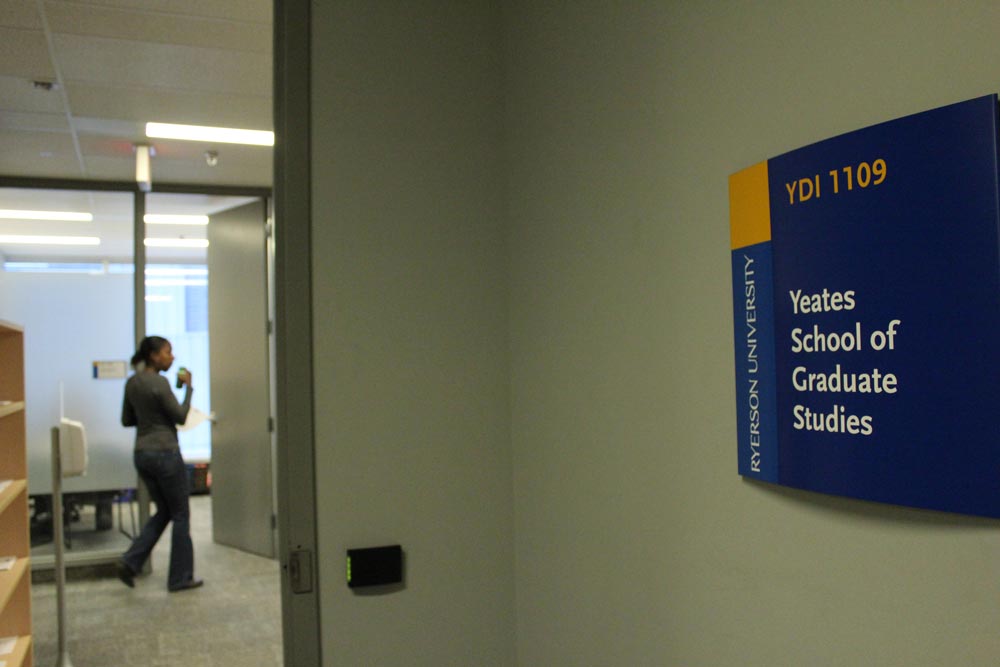By Mariana Ionova
News Editor
Master’s students in need of extra cash have to scramble to balance work and school because their programs are not designed to accommodate more than 10 hours of paid employment per week.
“There is a policy at the School of Graduate Studies,” said Colin Ripley, director of the master’s of architecture program, “that students should not have more than 10 hours per week of paid employment, on or off campus.”
Although students don’t face consequences for working beyond those hours, most graduate programs are simply not structured to support students working additional hours. Dr. Claus Rinner, director of the spatial analysis graduate program, said each student is required to take four core courses and allocate one full day per week to each course.
Rinner said this means the workload in the spacial analysis program — and most other graduate studies — is too heavy to allow students to work on the side.
“That leaves the one day — or 10 hours or so — to do any work for pay,” he said.
To help out students, faculty typically try to place them in Teaching Assistant (TA) or Research Assistant (RA) positions that pay $39 and $28 per hour, respectively.
The contracts for these placements also state that students cannot work more than 10 hours per week, or a total of 130 hours each semester.
“I have certainly discouraged students from seeking employment in addition to any such [TA] position on campus,” said Rinner.
But the earnings from these placements are often not sufficient for students supporting themselves. Jason Solnick, a master’s student in the environmental applied science and management graduate program, said supervisors generally “frown upon” students working outside of the program but he works part-time at the Ram in the Rye because the income he earns as a TA is not enough.
“I don’t live at home, I support myself. I needed a part-time job as an undergrad and I need it now,” said Solnick. “They just don’t give us enough money.”
Ripley said that graduate studies are a full-time commitment and taking on another job is often overwhelming for students.
“I have to say, being a graduate student is a full-time job already. And if you want to work somewhere else, you’re doing yourself a disservice,” said Ripley.
“It’s not a flaw. It’s a flaw of people who think they can do two full-time things at once.”
Instead, graduate programs try to partially fund students’ studies through other means. Although not all students are guaranteed a TA or RA job, faculty try hard to provide as many students as possible with these positions. If their program area isn’t hiring, students are often placed as TA’s in other faculties to ensure they have a placement.
“It’s guaranteed in a way,” said Solnick.
The university also supports graduate students through the Ryerson Graduate Awards and the Ryerson Graduate Scholarships, which provide large amounts of funding, according to Rinner.
But he added that students are often unclear on how much support they will receive from the university when they sign up for the program because faculty doesn’t know how much funding will be available until August or September.
“We can’t say in March or May, ‘yes, you are admitted and you will receive that much money’ and provide that clarity,” Rinner said.
Lauren Egar, a master’s student in the public policy and administration program, said it would be “daunting” to balance the heavy workload of her studies with a part-time job. But, between the scholarship she received and her earnings as a TA, Ryerson has provided her enough support to cover all her expenses.
“I’m certainly satisfied with it. I find that I’m making a reasonable amount of money and I’m comfortable managing my workload as well as working as a TA. But I know that some people might feel differently,” she said.
Although financing graduate school can prove difficult for some, Rinner said most students need to be prepared that the heavier workload of graduate school may not allow for paid work.
“I see it as an individual decision, where the student would have to plan ahead and know whether they can invest the year financially in this degree and then, hopefully develop an enhanced career and make up for the financial loss,” he said.










Leave a Reply